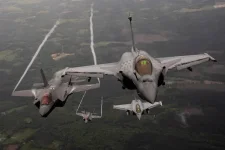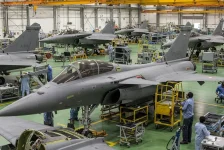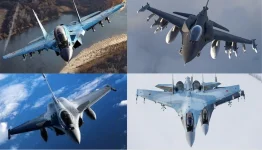- Views: 2K
- Replies: 20

India's ambitious plan to acquire 114 Multi-Role Fighter Aircraft (MRFA) for the Indian Air Force (IAF) is facing potential delays due to significant challenges in the global aerospace industry.
Supply chain disruptions, exacerbated by the pandemic, geopolitical tensions, and material shortages, have slowed down production timelines for major aircraft manufacturers, impacting India's defence procurement plans.
The MRFA tender, aimed at replacing the IAF's aging fleet of fighter jets, involves global aerospace giants like Lockheed Martin (USA), Dassault Aviation (France), Saab (Sweden), and BAE Systems (UK). These companies are grappling with a multitude of issues that are hindering their production capacities.
One of the primary challenges is the shortage of critical components, including microelectronics, sensors, and semiconductors, essential for modern fighter jets. This shortage, fueled by the ongoing global chip crisis, has severely impacted the production of avionics and radar systems.
Furthermore, the conflict in Ukraine has disrupted the supply of titanium, a crucial metal in aerospace manufacturing, as Russia is a major supplier. Sanctions and reduced exports have tightened the global supply, affecting aircraft production worldwide.
The pandemic has also left its mark on the industry, causing labor shortages and disrupting global shipping and transportation networks. Aerospace companies are struggling to find skilled labor required for the assembly and production of sophisticated fighter jet components, leading to production bottlenecks.
Delays in shipping essential components and raw materials, coupled with increased transportation costs, are further complicating manufacturing timelines.
These delays pose a significant challenge to India's MRFA tender. Contenders like the Dassault Rafale, Boeing F/A-18 Super Hornet, Lockheed Martin's F-21, and Saab's Gripen-E are all facing production issues.
Saab has reported delays due to shortages of electronic components and sensors, while Dassault, despite successfully delivering Rafale jets to India in the past, has warned of potential delays in future orders. Lockheed Martin and Boeing are also experiencing setbacks due to semiconductor and material shortages, respectively.
The MRFA tender process, already known for its length, may be further prolonged as the IAF awaits clarity on delivery schedules from these manufacturers. Any delay in production could push back the induction of new aircraft into the IAF fleet, potentially leaving India vulnerable with its aging jets.
Moreover, supply chain issues often lead to cost overruns, which could increase the price tag for the MRFA jets and impact India's defence budget.
Experts suggest that these delays could have significant implications for India's defence preparedness. The MRFA project is crucial for maintaining India's air superiority, and any delays could affect the country's air combat readiness in potential conflict scenarios.
In light of these challenges, there is a growing call for India to bolster its indigenous defence production capabilities. The country has already made progress with platforms like the HAL Tejas and the Advanced Medium Combat Aircraft (AMCA), which are being developed domestically.
Strengthening domestic production could reduce reliance on foreign suppliers and mitigate the risks associated with global supply chain disruptions.



